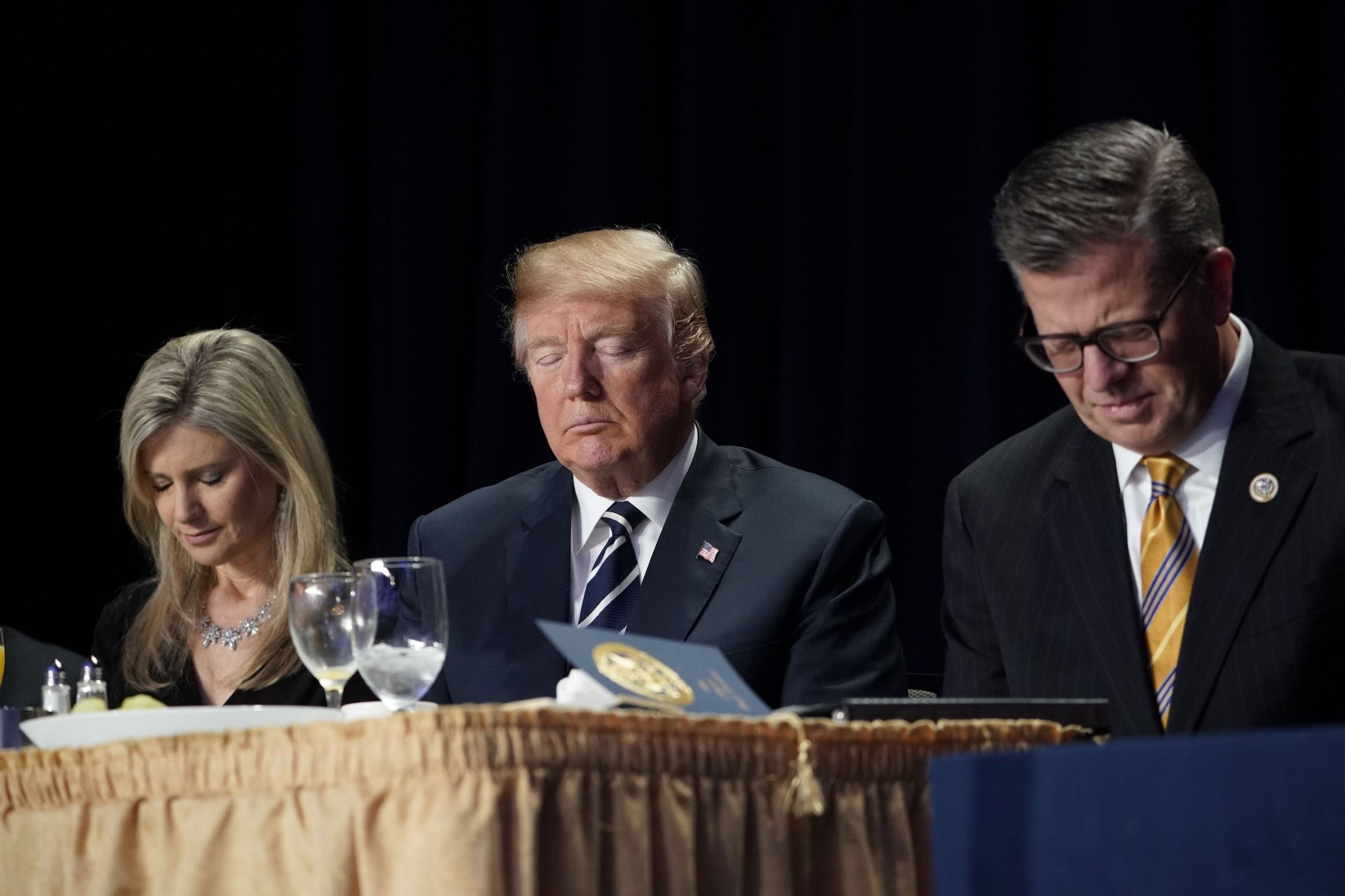
While the majority of Americans consistently report that they disapprove of President Trump, and millions rally to protest the Muslim Ban, attacks on the Affordable Care Act and anti-immigrant policies, one group has not wavered in its support of Trump: his faith advisors. Jerry Falwell, Jr. has celebrated Trump as a “dream president” and Franklin Graham said “God’s hand intervened” to elect him. At the 2018 National Prayer Breakfast in Washington, D.C., several speakers said no President in American history has done as much as this one to promote “religious freedom.”
To many within and beyond the faith community, these preachers’ claims raise eyebrows. How do Christian ministers reconcile the Jesus who said “Love your enemy” with a President whose policy is to strike back at all critics? Why would people who claim to stand for family values so uncritically support a thrice-married man who according to Ronan Farrow’s reporting for the New Yorker set up complex legal arrangements to cover up multiple affairs throughout his current marriage?
Eighty percent of white evangelicals voted for and, by and large, continue to support President Trump. To almost everyone else in America, this seems like a fundamental contradiction. But to Trump’s faithful, it is Providence at work in human history. They believe God is making America great again through an imperfect human agent. And like any true believers, they will not be moved.
As a preacher who grew up in the South during the Moral Majority movement, I know where my sisters and brothers are coming from. They feel that the “liberal media” and “secular humanists” seek to embarrass their heroes for standing by this President and therefore only confirm their conviction that they are an embattled minority, up against great odds with none but God on their side.
Trump is far from the first person to feed us this lie. In the 19th century, when black and white people built a moral movement in America to abolish slavery, plantation owners paid preachers to write theological defenses of white supremacy. Human bondage wasn’t only allowable for slaveholder religion. It was reflective of God’s design — a righteous order in society to be preserved at all costs.
Slavery went away, but this peculiar American faith did not. Historians refer to the movement to end Reconstruction in the South as “the Redemption movement” because Southern preachers told their people that God was redeeming them from Northern aggression and “Negro rule” when President Rutherford B. Hayes removed federal troops from the South in 1877. By 1896, “separate but equal” was the law of the land. A celebrated preacher of the early 20th century, Thomas Dixon, wrote a bestselling novel glorifying the Ku Klux Klan as champions of morality; by 1915, it was a major motion picture, The Birth of a Nation.
In America’s Gilded Age, slaveholder religion went national, blessing an alliance between industrial capital and white nationalism. When corporate tycoons lost credibility after the Great Depression, members of the national Chamber of Commerce paid The Birth of a Nation director D.W. Griffith’s pastor, the Rev. James Fifield, to popularize a 20th-century version of slaveholder religion that blessed the market and cursed those who preached a Social Gospel. Like the Redemption movement of the previous century, this campaign for “One Nation Under God” promised to save America from the “immorality” of the New Deal, Communism and the Civil Rights movement.
America’s long history of slaveholder religion makes clear that the faith of Trump’s preachers is not new. But it is also not the only faith in this land. Writing in the 19th century, when slaveholder religion was still taking root in white Americans’ consciousness, Frederick Douglass said, “Between the Christianity of the slaveholder and the Christianity of Christ, I see the widest possible difference.”
The faith that drove Douglass and thousands of others to risk all in the fight for abolition has also been passed down, one generation to the next, in the American story. Preachers like Sojourner Truth and J.W. Hood rallied the faithful to fight for Reconstruction after the Civil War, just as Social Gospelers were motivated by a moral vision, and the Civil Rights movement was sustained by the preaching of the Rev. Dr. Martin Luther King, Jr. and the freedom songs that flowed out of Southern churches into the streets and jails. This faith is with us still in churches that offer sanctuary to immigrant neighbors facing deportation and in the Moral Movement led by the Rev. Dr. William J. Barber, II.
If slaveholder religion is still with us in the 21st century, the moral force of this other tradition is with us as well. To distinguish between the two is to make clear that people of faith have a choice to make. Faith that props up extremism isn’t the only religion in our public life, but our history makes clear that slaveholder religion will dominate unless people of faith are willing to put our bodies on the line to insist on a better way.
More Must-Reads from TIME
- Donald Trump Is TIME's 2024 Person of the Year
- Why We Chose Trump as Person of the Year
- Is Intermittent Fasting Good or Bad for You?
- The 100 Must-Read Books of 2024
- The 20 Best Christmas TV Episodes
- Column: If Optimism Feels Ridiculous Now, Try Hope
- The Future of Climate Action Is Trade Policy
- Merle Bombardieri Is Helping People Make the Baby Decision
Contact us at letters@time.com